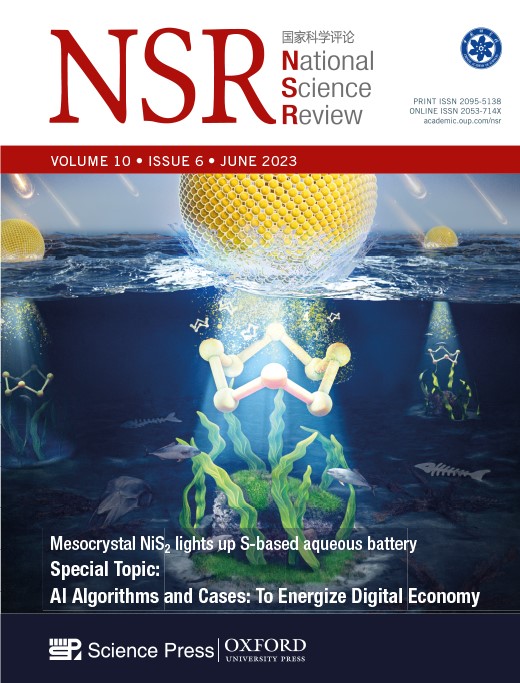Ru3@Mo2CO2 MXene single-cluster catalyst for highly efficient N2-to-NH3 conversion
IF 16.3
1区 综合性期刊
Q1 MULTIDISCIPLINARY SCIENCES
引用次数: 0
Abstract
Single-cluster catalysts (SCCs) representing structurally well-defined metal clusters anchored on support tend to exhibit tuneable catalytic performance for complex redox reactions in heterogeneous catalysis. Here we report a theoretical study on an SCC of Ru3@Mo2CO2 MXene for N2-to-NH3 thermal conversion. Our results show that Ru3@Mo2CO2 can effectively activate N2 and promotes its conversion to NH3 through an association mechanism, in which the rate-determining step of NH2* + H* → NH3* has a low energy barrier of 1.29 eV. Especially, with the assistance of Mo2CO2 support, the positively charged Ru3 cluster active site can effectively adsorb and activate N2, leading to 0.74 |e| charge transfer from Ru3@Mo2CO2 to the adsorbed N2. The supported Ru3 also acts as an electron reservoir to regulate the charge transfer for various intermediate steps of ammonia synthesis. Microkinetic analysis shows that the turnover frequency (TOF) of the N2-to-NH3 conversion on Ru3@Mo2CO2 is as high as 1.45 × 10−2 s−1 site−1 at a selected thermodynamic condition of 48 bar and 700 K, the performance of which even surpasses those of the Ru B5 site and Fe3/θ-Al2O3(010) reported before. Our work provides a theoretical understanding on the high stability and catalytic mechanism of Ru3@Mo2CO2 and guidance for further designing and fabricating MXene-based metal SCCs for ammonia synthesis under mild conditions.用于实现 N2 到 NH3 高效转化的 Ru3@Mo2CO2 MXene 单簇催化剂
单簇催化剂(SCC)代表了锚定在载体上的结构明确的金属簇,在异相催化的复杂氧化还原反应中往往表现出可调的催化性能。在此,我们报告了一项关于 Ru3@Mo2CO2 MXene SCC 用于 N2 到 NH3 热转化的理论研究。我们的研究结果表明,Ru3@Mo2CO2 能有效活化 N2,并通过缔合机制促进其转化为 NH3,其中 NH2* + H* → NH3* 的速率决定步骤具有 1.29 eV 的低能垒。特别是在 Mo2CO2 支持的帮助下,带正电荷的 Ru3 簇活性位点可以有效地吸附和活化 N2,导致 0.74 |e| 电荷从 Ru3@Mo2CO2 转移到吸附的 N2 上。支撑的 Ru3 还可作为电子库,调节氨合成各中间步骤的电荷转移。微动力学分析表明,在选定的 48 bar 和 700 K 热力学条件下,Ru3@Mo2CO2 上 N2 到 NH3 转化的周转频率(TOF)高达 1.45 × 10-2 s-1 位点-1,其性能甚至超过了之前报道的 Ru B5 位点和 Fe3/θ-Al2O3(010)。我们的工作从理论上理解了 Ru3@Mo2CO2 的高稳定性和催化机理,并为进一步设计和制造用于温和条件下合成氨的 MXene 基金属 SCC 提供了指导。
本文章由计算机程序翻译,如有差异,请以英文原文为准。
求助全文
约1分钟内获得全文
求助全文
来源期刊

National Science Review
MULTIDISCIPLINARY SCIENCES-
CiteScore
24.10
自引率
1.90%
发文量
249
审稿时长
13 weeks
期刊介绍:
National Science Review (NSR; ISSN abbreviation: Natl. Sci. Rev.) is an English-language peer-reviewed multidisciplinary open-access scientific journal published by Oxford University Press under the auspices of the Chinese Academy of Sciences.According to Journal Citation Reports, its 2021 impact factor was 23.178.
National Science Review publishes both review articles and perspectives as well as original research in the form of brief communications and research articles.
 求助内容:
求助内容: 应助结果提醒方式:
应助结果提醒方式:


